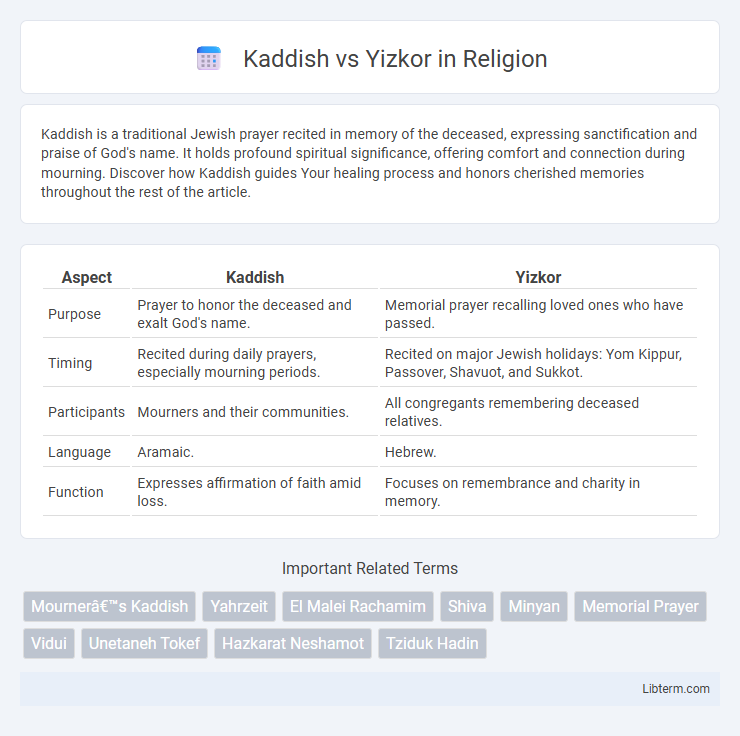Kaddish is a traditional Jewish prayer recited in memory of the deceased, expressing sanctification and praise of God's name. It holds profound spiritual significance, offering comfort and connection during mourning. Discover how Kaddish guides Your healing process and honors cherished memories throughout the rest of the article.
Table of Comparison
| Aspect | Kaddish | Yizkor |
|---|---|---|
| Purpose | Prayer to honor the deceased and exalt God's name. | Memorial prayer recalling loved ones who have passed. |
| Timing | Recited during daily prayers, especially mourning periods. | Recited on major Jewish holidays: Yom Kippur, Passover, Shavuot, and Sukkot. |
| Participants | Mourners and their communities. | All congregants remembering deceased relatives. |
| Language | Aramaic. | Hebrew. |
| Function | Expresses affirmation of faith amid loss. | Focuses on remembrance and charity in memory. |
Introduction to Kaddish and Yizkor
Kaddish is a traditional Jewish prayer primarily recited in memory of the deceased, emphasizing sanctification and praise of God, often said by mourners during prayer services. Yizkor is a memorial service held four times a year in synagogues to honor and remember departed loved ones, typically involving additional prayers and personal reflection. Both Kaddish and Yizkor serve to commemorate the dead, but Kaddish is a prayer recited regularly by individuals, while Yizkor is a communal service observed on specific holidays.
Historical Origins of Kaddish and Yizkor
The Kaddish prayer originated during the Talmudic period as a sanctification of God's name recited by mourners to honor the deceased and affirm faith amidst grief. Yizkor, meaning "may He remember," emerged in medieval Europe, evolving from memorial customs to a communal prayer recited four times annually in synagogues, commemorating deceased relatives and victims of calamities. Both prayers reflect deep historical roots in Jewish liturgical traditions, serving distinct but complementary roles in mourning and memory.
Purpose and Meaning: Kaddish vs Yizkor
Kaddish and Yizkor serve distinct yet complementary roles in Jewish mourning practices, with Kaddish primarily being a prayer recited to honor the deceased and affirm faith in God, fostering spiritual elevation for the departed soul. Yizkor, a memorial service held on specific Jewish holidays, commemorates loved ones through collective remembrance and personal reflection, emphasizing the enduring impact of the deceased on the community. Both rituals deepen the connection between the living and the dead, providing solace and continuity within Jewish tradition.
When Are Kaddish and Yizkor Recited?
Kaddish is recited daily during mourning periods, especially at synagogue services following the death of a close relative and on the anniversary of the death, known as the yahrzeit. Yizkor is recited four times a year on specific Jewish holidays: Yom Kippur, Passover, Shavuot, and Shemini Atzeret, serving as a communal memorial prayer for the deceased. Both prayers play distinct roles in Jewish mourning rituals, with Kaddish emphasizing ongoing remembrance and Yizkor focusing on collective memory during sacred occasions.
Who Recites Kaddish and Yizkor?
Kaddish is recited primarily by mourners, typically children of the deceased, during prayer services to honor their loved ones and express a commitment to God's name. Yizkor is recited by all members of the community on specific Jewish holidays, including Yom Kippur and Passover, to remember deceased relatives and victims of tragedies. While Kaddish emphasizes personal mourning, Yizkor serves as a collective memorial for both family and communal losses.
Textual Differences: Kaddish vs Yizkor
Kaddish is a sanctification prayer primarily composed of phrases praising God and affirming faith, structured to elevate God's name, while Yizkor is a memorial prayer containing personalized supplications for the souls of deceased loved ones. The Kaddish text does not mention the dead directly but emphasizes divine greatness, whereas Yizkor includes specific pleas for forgiveness, rest, and consolation for the departed. Textually, Kaddish serves a communal liturgical function, and Yizkor functions as a private memorial with a focus on individual remembrance.
Ritual and Synagogue Practices
Kaddish is a mourners' prayer recited daily during synagogue services, serving as a public expression of grief and honoring the deceased, often said for 11 months after a loved one's passing. Yizkor, on the other hand, is a memorial prayer typically recited four times a year on major Jewish holidays--Yom Kippur, Passover, Shavuot, and Shemini Atzeret--to remember all deceased relatives and communal victims. Synagogue practices for Kaddish involve the presence of a minyan (quorum of ten adult Jews), whereas Yizkor requires specific holiday services with designated readings and congregational participation.
Emotional and Spiritual Significance
Kaddish and Yizkor hold profound emotional and spiritual significance in Jewish tradition, serving crucial roles in honoring the deceased. Kaddish, recited by mourners, expresses a deep commitment to God's sanctity and offers comfort through communal prayer that reinforces faith amidst grief. Yizkor, observed on specific holy days, enables individuals to reflect, remember, and spiritually connect with departed loved ones, fostering ongoing emotional healing and remembrance.
Kaddish and Yizkor in Contemporary Jewish Life
Kaddish remains a central prayer in contemporary Jewish life, recited by mourners daily for eleven months to honor the deceased and affirm faith amidst grief. Yizkor, recited four times annually during major Jewish holidays like Yom Kippur and Passover, serves as a communal remembrance for departed loved ones, connecting individuals to their heritage and collective memory. Both prayers play vital roles in sustaining Jewish identity and spiritual continuity through mourning and memorial traditions.
Conclusion: Honoring Memory Through Prayer
Kaddish and Yizkor serve distinct yet complementary roles in Jewish mourning practices, with Kaddish recited by mourners as a sanctification of God's name and a public declaration of faith, while Yizkor is a memorial prayer recited collectively to honor the departed during specific holidays. Honoring memory through these prayers strengthens communal bonds and ensures the enduring spiritual presence of loved ones within Jewish tradition. The integration of Kaddish and Yizkor highlights the balance between personal grief and collective remembrance in preserving ancestral legacy.
Kaddish Infographic

 libterm.com
libterm.com